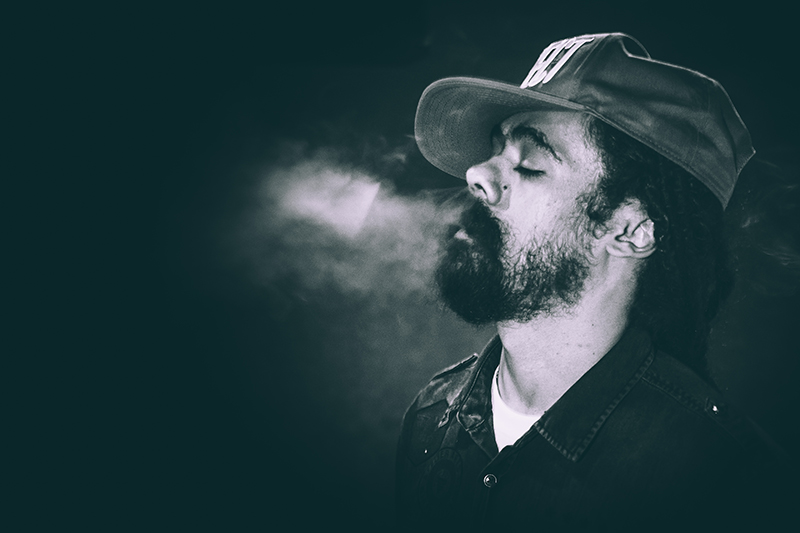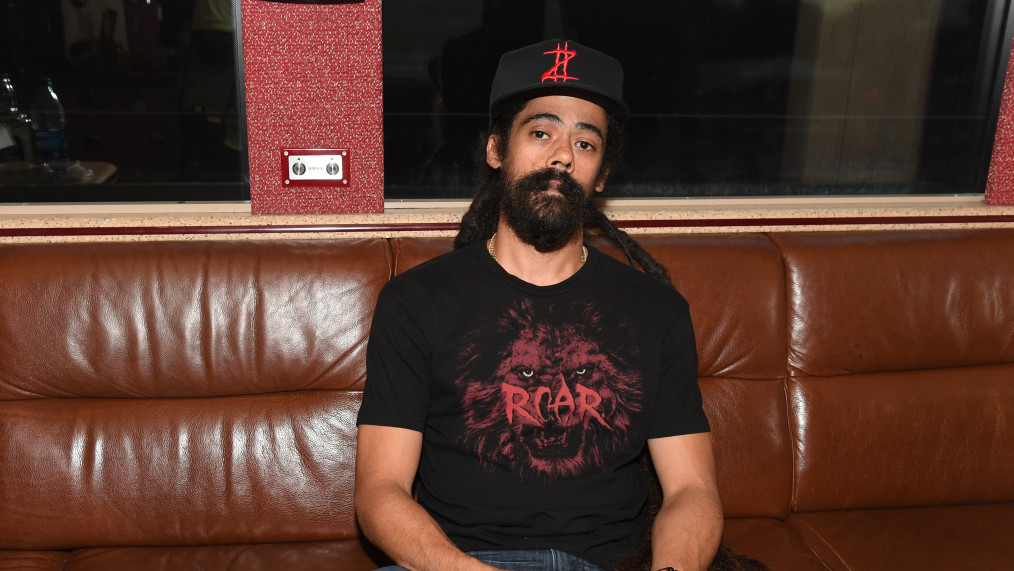Exclusive: Damian Marley on His New Album 'Stony Hill,' JAY-Z, & Social Justice
It’s been a long time since Damian “Jr. Gong” Marley released a new album, 12 years to be exact. But the youngest son of Bob Marley returns with a high-profile JAY-Z collaboration (“BAM”) and a new album, Stony Hill, his first since 2005’s Welcome to Jamrock.
Sitting down at Nightbird Studios at the Sunset Marquis in West Hollywood, the reggae legend reflected on his time away and his evolution. “If you really think about it,” he says, while seated in front of the switchboard. “Who doesn’t grow in 12 years?”
During that time, Marley has traveled and learned from new experiences, including fatherhood. Now, he’s sharing those lessons on Stony Hill, a motivational record, which showcases Marley’s depth. In a candid conversation with Rap-Up, the reggae royalty opened up about his upbringing, his father’s legacy, his bond with Hov, and his continued growth.
This album feels motivational. What were the experiences that inspired that?
Wow. I would say it’s always an ambition of ours to motivate people to better themselves and better their communities for a better life. Then, of course, a lot of inspiration comes from my own experiences, to motivate ourselves and people around us, who are close to us, our countrymen. All music is a true expression of ourselves. We don’t really make music to make a product, necessarily. It starts with a true expression and then we figure out how we’re going to make it a product.
In recent years, what influenced that perspective?
Multiple things, I mean, becoming a father, losing close friends, gaining new ones, traveling to different places that I haven’t been previously, and growth as a person….[I went to] Africa, Israel, and just touring in general, even to places that I’d been before. But every day is a new day and you experience something different and you learn something new. More so than even places, I’m a more experienced person.
“It is important to be a voice for underprivileged people and I will always continue to do so.”
What was it like growing up in Stony Hill and why was it important to name this album after your hometown?
Stony Hill was a great place to grow up for me. Traditionally, it’s known as one of the nicer parts of Jamaica, a lot of privileged neighborhoods in that area. That’s kind of what I was trying to highlight, the journey of my family, of my father, coming from the country to the ghetto until meeting up with my mother and having a child like myself, who was born in uptown Jamaica, which is what we call the privileged side of Jamaica. Traditionally, over the years, we’re known for speaking on behalf of underprivileged people and every now and then, we get criticism [like], ‘You didn’t live an underprivileged life, so why are you so involved? Why do you see yourself as a mouthpiece for the underprivileged?’ So, again, never have I ever tried to be something I wasn’t. At the same time, it goes without saying, that I feel it is important to be a voice for underprivileged people and I will always continue to do so.
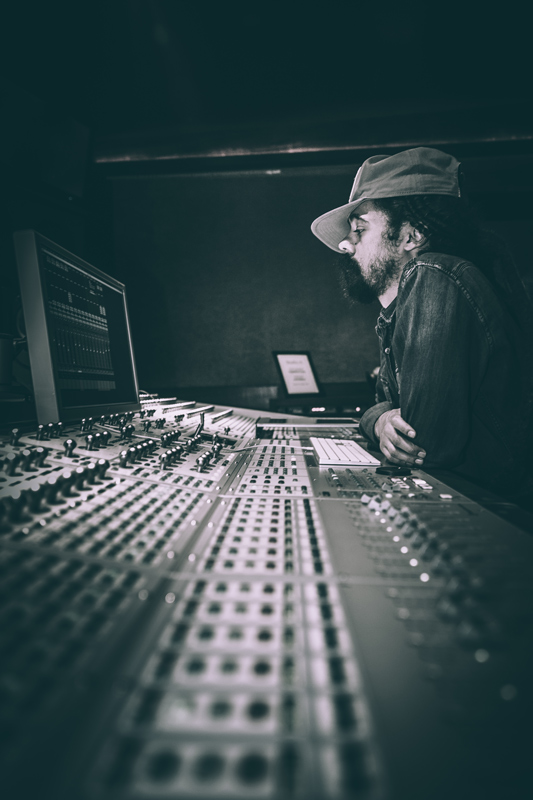
What contributed to that sense of responsibility?
Knowing where my family comes from, knowing where my father comes from. Hearing from people, having friends who come from underprivileged circumstances. People are people so we care for people. We have friends who come from all walks of life, so I care for people from all walks of life.
“Living It Up” addresses that and samples the theme song from “The Fresh Prince of Bel-Air.” How did that come about?
“Fresh Prince” is about a kid who is coming from a more rough surroundings and going to live in a more privileged surroundings. That’s part of the story of this album and the journey of my family history. It kind of ran parallel to what I was saying in the song, which is why I called upon that reference.
The song celebrates that success. It’s saying, “This is what we want. We want to get out of the ghetto.
Absolutely, absolutely. As much as people defend their neighborhoods, represent for their neighborhoods, and are proud of their neighborhoods, I don’t think that given the opportunity, anybody who is living in the ghetto wouldn’t like to be living in a better place. Or, perhaps, if not to move, then perhaps to change their surroundings. That goes without saying. That’s something to be proud of, when somebody achieves that, when you come from humble surroundings but have made a better way for the generation that will follow you.
“Being who my father is, you learn a lot from his music about life and his morals.”
“So a Child May Follow” has a Slick Rick/Nas-inspired line. What was it about that lyric that spoke to you for this song?
I really like when them say, “Hey, young world, the world is yours.” When you’re young, you have opportunity. The world is yours. You have an opportunity to become whoever you want to be, to mold the world and mold your life. There’s a power in being youthful. In the scripture, it says, “Jah will call on the youths because they are strong.” I think that when you recognize that, as a young person, it’s better for you. Some of us have been lucky enough to recognize that as young people and have made good use of the time to lay a foundation for ourselves in our young years.
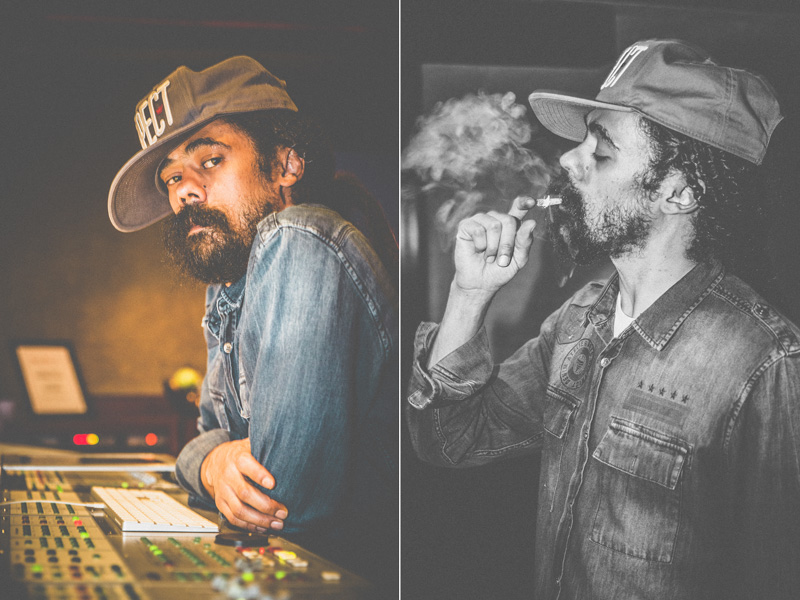
What were the influences or elements that allowed you to learn that as a child?
The way I was raised. I was raised by my step father and my mother, and sent to a good school. Education helps, of course, and reading. Coming up in Jamaican culture, being who my father is, you learn a lot from his music about life and his morals. Reggae culture, in general, Marcus Garvey, his Imperial Majesty Haile Selassie, these kinds of teachings. You cannot help but be a self-aware kind of youth.
You and Nas released your joint album Distant Relatives in 2010. Will we ever see a sequel?
It’s possible. For sure, it’s possible. I mean, we don’t have any plans in the books, at the moment, but every time I see Nas, I always say I’d love to do that again. It’s definitely possible.
What do you think that project did for you and Nas? What did you take away from it?
For me, it was a big confidence builder. Working with Nas, who is one of the great lyricists of hip-hop. He’s revered throughout the genre as a legend. Regardless of how I feel about him as a fan, it’s pretty much decided that he’s a legend in rap, right? So, to be in that company, for him to even say he’s willing to do an album with me, is something that speaks a lot to how he rates my music and how hip-hop in general rates my music. So, it was a confidence builder. It introduced me to new audiences, being that his fans were introduced to my music and I introduced him to some new audiences too, especially overseas in Europe and certain other places. I can’t put it into words, but the experience, we toured together for two years, so you pick up little things that you can’t always remember to put it in a sentence, but you always pick up things.
This year, you also collaborated with JAY-Z on “BAM.” How did the song came together?
Well, let me take it from the beginning-beginning, then. I first met JAY-Z when my single “[Welcome to] Jamrock” became popular. At the time, I was a free agent so to speak, so I was being shopped by a lot of labels, who were trying to speak to me. JAY was interested in signing me to Def Jam. That was the first time I met him and I continued to run into him over the years. Then, he invited me to be a part of TIDAL. So, there again, we started having some more regular communication with our teams and I had a few meetings with him personally. He actually came by the studio and listened to a lot of my album on one of the nights, while he was in Miami. So, we’ve kind of been involved in that way.
He knew that I was coming out here to California to come and shoot the video for “Medication.” He text me and said to me, “I would love if you’d swing by the studio for a few hours. I have an idea I would like to play for you.” I was like, “Sure. I’d be honored.” I came by and when I got to the studio, he actually started off by playing the entire album, including “BAM,” which had the empty verse. He played the complete album for me and he already knew what he wanted for the hook of “BAM,” which was basically Jacob Miller, Inner Circle, [“Tenement Yard”], a twist on their hook. So, I put my little spin on that idea. Then, he said to me that he would love if I could vibe on the track, try to come up with a verse or something. They looped the track up for like 15 minutes and I was just freestyling and just having a good time, basically. Then, they went and edited little sections of the freestyle that they liked and kind of constructed what you hear as my verse at the end. It was a great experience for me, being that I’m a big fan of his music and I would have always loved to do a track with with him so that was nice.
After doing that, he said he would like to go to Jamaica to do some visuals. I was touring, so he actually flew me from Ethiopia to Jamaica straight. It took us about 14-15 hours or so. Then, we were in Jamaica for two days together and we took him to Tuff Gong Studio, which is a studio that my family owns. We also went to Trench Town, which is a community where my father grew up as a young man. We took him to Hellshire Beach, which is a famous part in Jamaica, a popular beach in Kingston. It’s well known for the food there. It was cool because, over the two days, we had a lot of opportunities to speak. As you can see, when you look at the footage, it’s not really so much performing the song. More so we’re just kind of vibing with each other so we spoke about a lot of stuff. As a fan, I got the opportunity to ask him a lot of questions that I would be wondering while listening to his music, so it was cool.
You said you learned a lot from JAY. What did you take away from those conversations?
These things are kind of hard to summon up in sentences a lot of times. Definitely, with both JAY and Nas, keeping the integrity in music and staying true to yourself. Both of them are very grounded individuals. As big as JAY is, he’s still very humble, down to earth. Cool sense of humor. It was a good time. More than doing it because the camera is here or because it’s JAY-Z, I enjoyed myself, actually speaking to him. You know, I can actually remember him saying to me — not in Jamaica, but in one of our previous conversations — he said how important it is to keep your integrity in your music and that’s a lesson. I knew that, but hearing him say that, somebody who’s been so commercially successful, was reassuring.
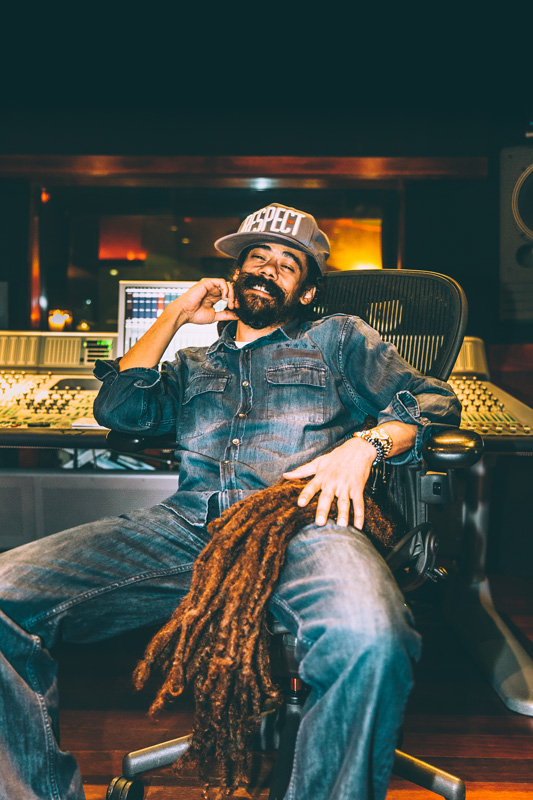
That thought about integrity and staying true to the cause brings me back to Stony Hill, where you talk about police brutality. What inspired those lyrics in particular on “Slave Mill?”
I was watching the news and seeing what’s going on in America, the Trayvon Martins and those kinds of cases, where you see people being stereotyped and they’re killed when they’re unarmed or even if they’re armed, they have a right to carry the arms and they weren’t brandishing their guns. So basically, innocent civilians being killed by police is what really inspired that song in general. Then, of course, the topics starts to branch off from there. Speaking about the “Slave Mill” is much wider, so I started talking about the 9-5, about the work environment, and other things, but the original inspiration was about the police killings that have been happening up here.
Another injustice you talk about is incarceration of marijuana dealers at a time when corporations who tried to stop it are buying their shares. What was the message you wanted to convey on “Medication?”
With “Medication,” I wanted to do a lot of things. That particular part of the song you’re talking about, it’s one of my concerns. With the legalization of marijuana, one of my concerns is that people who have sacrificed over the years because of growing it, transporting it, selling it, and even smoking it, are not really, necessarily at the frontier of the business of it. These people are not paper pushers and they’re not really people who understand legislation and these things in the first place. They’re outlaws. They’re rebels. But it would be a shame if they no longer have the opportunities to feed their families because corporate structures are coming in and taking over the business. Now, it’s wins and losses because if it was a business that the corporate structure didn’t want to be involved with, then it wouldn’t be a business worth having. But, there needs to be some form of awareness and line drawn where it can benefit both worlds. It would be a shame because these people have sacrificed so much over the years, myself included. For years, we’ve been hiding herb from police and searching luggage before you take a flight a million times and all of these kinds of things. It would be a shame if we weren’t a part of it all. That’s what I’m saying in those lines there.
Otherwise, with “Medication,” what I tried to do was highlight the medical benefits of marijuana. It’s no secret that we’ve been recreational smokers for years, but we’ve always known that herb is the healing of the nation and now we have research that is proving that. With it becoming legal in certain places, more research has been done and we see the medical benefits of it. That goes far beyond “Can we smoke it or not?” Let’s put the smoking aside. The medical benefits of it is something that it should be allowed. There’s creams, there’s ointments, tablets, edibles, all kinds of things. You can benefit from it medically without even getting high, like CBDs. The range of illnesses that are benefitting from it is crazy because it’s not just the usual suspects that we’ve known marijuana to be good for over the years. Over the years, we already know smoking herb helps with a cancer patient getting back their appetite after doing chemo. But it’s helping with Parkinson’s, Crohn’s disease, multiple sclerosis, epilepsy, the list goes on, without the side effects of pharmaceutical drugs. I don’t see which person in their right mind would not support that.
Were you a hip-hop fan as a kid? At what point did it enter your world?
Hip-hop started to enter my world at a very young age because I had cousins who were growing up in America at the time. Jason and Justin, big up yourselves. So, they would come down with the latest stuff that they were listening to. I’m talking about from Slick Rick’s first album, Biz Markie, Fat Boys, when N.W.A came out. They would come with all of that stuff, at first. I would mostly hear it when I was around them. I got a Christmas gift one year, which was LL Cool J’s Mama Said Knock You Out. That was the first hip-hop album that I actually had for myself. Then, when Snoop Dogg came out, that’s when I really started to buy hip-hop music. From there on, I just continued.
What was it about hip-hop that spoke to you?
I liked the cleverness of the lyrics. For example, LL Cool J’s [Mama Said Knock You Out], I was like, “Those are some clever lyrics.” With Snoop, one of the things I could really relate to was herb culture. His love for herb was something I could tune into. After that, just becoming a fan, wanting to hear more of it. I went on tour with my brothers and sisters [Ziggy Marley and] The Melody Makers, who were headlining “Smoking Grooves Tour” one year. That year, Fugees were on the bill, Busta Rhymes was on the bill, I believe A Tribe Called Quest was on the bill. Being there and watching the shows live and observing the energy made me more of a fan. That’s continued to this day.
–Words and photos by Andres Tardio
